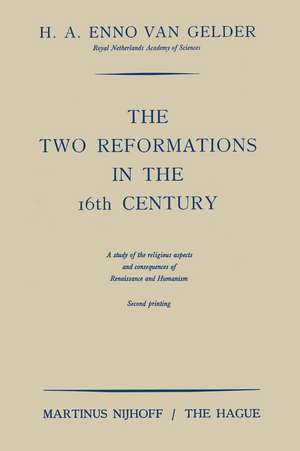The Two Reformations in the 16th Century: A Study of the Religious Aspects and Consequences of Renaissance and Humanism
Autor H. a. Enno Gelderen Limba Engleză Paperback – 1964
Preț: 394.12 lei
Nou
Puncte Express: 591
Preț estimativ în valută:
75.44€ • 81.97$ • 63.41£
75.44€ • 81.97$ • 63.41£
Carte tipărită la comandă
Livrare economică 22 aprilie-06 mai
Preluare comenzi: 021 569.72.76
Specificații
ISBN-13: 9789401187206
ISBN-10: 9401187207
Pagini: 420
Ilustrații: XII, 406 p. 1 illus.
Dimensiuni: 152 x 229 x 22 mm
Greutate: 0.56 kg
Ediția:1961
Editura: SPRINGER NETHERLANDS
Colecția Springer
Locul publicării:Dordrecht, Netherlands
ISBN-10: 9401187207
Pagini: 420
Ilustrații: XII, 406 p. 1 illus.
Dimensiuni: 152 x 229 x 22 mm
Greutate: 0.56 kg
Ediția:1961
Editura: SPRINGER NETHERLANDS
Colecția Springer
Locul publicării:Dordrecht, Netherlands
Public țintă
ResearchCuprins
The Problem.- I Italy.- I. The Italian Humanists and the Christian Doctrine of Salvation.- II. Propagation and Expansion in Italy.- II Western Europe.- III. Orthodox Catholicism and its early Opponents.- IV. Erasmus.- V. Erasmus’s Contemporaries.- VI. Luther.- VII. The Baptists, Sebastian Franck and Marguerite d’Angouleme.- VIII. Christian Humanism in France.- IX. In the Netherlands.- X. Christian Humanism in England.- XI. Dolet, Marlowe, Montaigne and Bodin.
